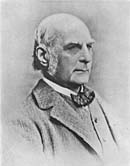


"Eugenics is the study of the agencies under social control that may improve or impair the racial qualities of future generations either physically or mentally." |
Sir Francis Galton, 1904 |

After the turn of the century, "eugenics" developed into a world-wide movement led by scientists and scholars in diverse fields, funded by wealthy philanthropists, and supported by statesmen. Eugenics played an important and, at times, central role in the political, social, and intellectual history of many diverse peoples and nations.
Always controverisal, eugenics in theory and practice attracted criticism; opposition inspired revisions. Interpretations of eugenics and its particular manifestations in public policy varied according to time, place, and professional and political cultures. As the documents listed here show, the meaning of eugenics has shifted with each generation.
Continue to . . .